Inside: Worried about your kids acting rude or rude kids around the holiday season? We’ll cover everything from why kids act rude in the first place to how to best respond to kids – all while staving off the discerning looks from family members.
The holidays are one of those times where you can feel the increasing pressure to make sure your kids are acting polite.
It’s almost like you’re a kid again, and you can feel your mother looking down on you with discerning eyes.
Case in point…
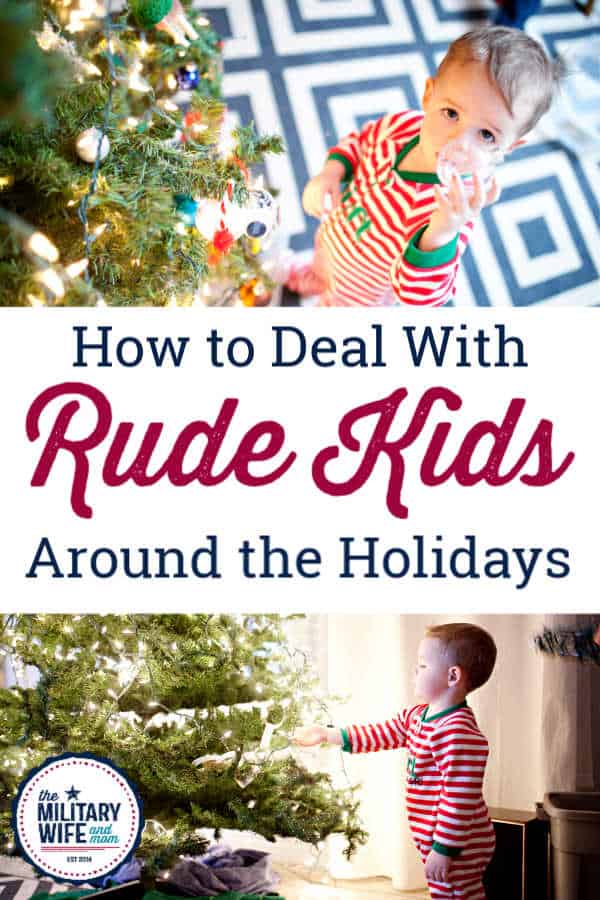
Several Christmases ago we visited my in-laws, and as soon as all the extended family arrived, my son proceeded to have a huge meltdown over moving to a new home. The more I tried to calm him down, the more intense and wild his emotions became.
(Looks like an emotionally out-of-control child.)
To add to the fun, he refused to eat anything but bread. Everything else on his plate was described with a loud “yuck!”
(Looks like one of those very picky-eater kids.)
And while opening presents, a permanent look of disappointed painted across his face. Not much under the tree seemed to impress him, and all I remember thinking was…my heart is sinking.
(Looks like a child without gratitude or manners.)
By the time Christmas Eve was over, I wanted to crawl under the covers and hibernate…like a bear.
I was so embarrassed by my kid’s “rude” behavior.
Because in my mind, all other people saw was a emotionally out-of-control, picky-eating, ungrateful child. I took this as a direct reflection of my parenting, which basically meant I was a horrible mother.
Throughout December all you see are commercials with people gifting Lexus SUVs and sedans to each other, while the children gleefully play in the background.
The reality is you’re praying for a Christmas where your kid says thank you from time to time, eats more than a bun and saves the meltdown for the privacy of your own home – or at least the car ride home.
Unfortunately, it doesn’t always happen that way.
How do you deal with rude kids during the holidays?
You hate guiding your kids toward manners, politeness and gratitude only to have them throw it all out the window at family gatherings or holiday outings. It’s like they’re constantly doing the opposite of what you say – on purpose!
It can feel very demoralizing.
Over the past year, we’ve worked a lot to help turn “rude” situations around quick – even with lots of people around.
1. Let’s be real about why kids are melting during the holidays.
Kids are put into some very unfamiliar situations with loud noises, lots of people and strange foods. On top of all that, their sleep is less than normal and they’re eating wayyyy more sugar and less nutrients than usual.
They may even be watching a lot more screen-time and Christmas movie “treats.”

Kids are thrown completely out of their element, and then we fall into the trap of expecting them to behave in spectacular fashion. I mean, honestly.
My own mother used to chase my grandma out of the kitchen with a broomstick every year, and then my grandma used to hide on the porch and cry. I’m not joking. This really happened.
DRAMA.
If adults struggle to act civil during the holidays, then it makes perfect sense that children don’t respond perfectly with pleasantries on demand.
2. Create rules. Help kids know what to expect.
I like to play parenting offense. It’s a lot more fun than defense, and it keeps you from falling into threats, bribes and brash demands. It also has the magical ability to keep you from saying, “If you don’t start doing…then we’re leaving!”
Because unless YOU really want to leave, the threat doesn’t really serve anyone.
On the way to your holiday event, create some rules in the car and talk about what you expect for behavior. If you’re hosting, create rules in the hours before guests arrive. Allow the kids to make some rules too, and this helps them feel a sense of connection to you and power over the situation.
I always love to make up a few silly rules too…like you can’t say the word “Christmas Tooty” because this gets everyone laughing and excited about creating rules around gratitude, manners and politeness.
3. Remember: Your child’s behavior is all about them. It’s not about you.
It’s easy to fall into the trap that kids are doing things to embarrass us – on purpose!
Even though kids resistance is aimed at us – the parents – looking into how it is not really about you, but actually about them, can give you more distance and help you feel less reactive.
When kids fall into whining, back talk or disrespect, it’s about meeting their own needs for power and control than it is about doing something to you.

If your child is struggling with manners or gratefulness, step into your child’s perspective and walk around in it with him for a moment.
Using SAY WHAT YOU SEE® – a technique from the 3-part parenting framework I use and teach to parents – it might sound something like this:
“You don’t want to do what I’ve asked. There must be something going on here because otherwise you’d say thank you instead of running away.”
4. Stop reacting. Start exaggerating.
All kids have Three Basic Needs – experience, power and connection. As adults, we have the same Three Basic Needs as our kids. And just like our kids, our bodies’ reactions to a trigger like rude or disrespectful behavior are our way of meeting our own need for power.
According to my mentor Sandy Blackard, and founder of Language of Listening®, the best thing you can do in those moments is to go into it more rather than trying to stifle it.
Sandy reminded me this: “You would never try to cap an active volcano, but that’s what we do to ourselves, and then we start fueling the next explosion immediately when we start kicking ourselves for being volcanos!”
When you’re feeling triggered by your kids refusing to say thank you or being silly during the family prayer, you can use exaggeration as a tool to help meet your need for power.
It might sound something like this…
“Oh, I’m so frustrated right now! I think the mom volcano is about to erupt! Roooarrrrrrrrrrrr!”
Roaring, stomping and spinning across the room will help you meet your need for power, bring humor to the situation and helps kids open up to your guidance.
- Read more here: Stop Reacting, Start Exaggerating
5. Go ahead – Say the Unsaid.
When kids act out, go ahead and say the unsaid – the one thing you don’t want to be true.
“You don’t want to sit at the dinner table and eat this food.”
“You don’t like the present you got.”
“You don’t want to say ‘thank you’ to Grandpa for getting you the toys.”
Saying that as a validation, instead of reacting to it can be a great turing point. Not saying it, defending it or trying to change it, makes it more true to a child.

When you say, “It was so nice that Grandpa got out the toys and you should really say thank you,” the child may come back and say, “No, I don’t want to!”
The more you try to make the child say thank you, the more they will try to prove to you that they are right not to say it.
Instead, go ahead and say the unsaid – the one thing you don’t want to be true. Validating the child’s perspective instantly connects you, and it’s the one piece that will help open them to your guidance.
THEN…
Offer alternatives the child could say or do in the situation that would work better. It might sound something like this:
“You could say, ‘Thank you for the toys’ later when you’re ready. Or you could give grandpa a hug to show him that you care. Or you could write him a thank you note or draw a picture later. You could also enjoy the toys and tell him how much fun you had.”
6. Diffuse the opinions of others with one phrase.
Just like childhood is not a race to see how quickly a child can read, write or count, it’s not a race to see who can act the most perfect at holiday gatherings.
“Childhood is a small window of time to learn and develop at a pace that is right for the individual child. Earlier is not better.” – Magda Gerber
Learning manners, politeness and gratitude are life skills that build over time. Family members may have their opinions about two and three year-olds and beyond. It’s easy to forget how long it takes to help kids learn social graces, especially when you’re not in the thick of it yourself!
If you feel the outside pressure or gawking looks from friends and family, you can use this one phrase that my sweet friend shared with me:
“We are working on it.”
- Read more here: How to Be a Confident Parent With Extended Family
7. Step out, rather than stay in.
Put your kids on the spot, and they are sure to resist and revolt against your request.
Nobody enjoys being put on stage unexpectedly for all the extended family to watch and gawk. Pull back the stage curtain (or just excuse yourselves to the laundry room) and have a heart-to-heart with your child.
Kids are far more likely to open to your guidance when they feel safe and secure. Then go back and try again with a Do-Over. This is where you go back and acknowledge the child’s highest intention in the situation.
“You just wanted to get started playing with the toys. That’s why you didn’t want to bother saying thank you. There must be some way you could show gratitude or manners.”
8. Remember: There are lots of ways to show gratitude, politeness and manners.
To adults, we can fall into the trap of thinking social customs like saying thank you immediately after being given something (whether you like it or not) is the only way to show thankfulness.
It almost becomes like a knee-jerk reaction, where we say thank you, but deep down we aren’t all that thankful for the bright green grinch socks from Uncle Jack.

Look to “catch” your kids in moments of gratitude to help show them they already have this wonderful trait. There are a lot of ways to give thanks, show gratitude and manners.
Some use words like please, thank you and you’re welcome. Others use actions like eating a whole meal because they loved it or playing with toys for hours because they were so fun. Another way is to send a message or letter afterward letting a person know you care about them.
You can try saying something like this…
“You’re playing with the toys Grandpa got out for you. You must really love them. That shows you’re grateful.”
Want more on parenting?
- After Holiday Meltdowns: Why They Happen and How to Fix It
- 50+ Open-Ended Toys That Will Keep Your Kids Busy for HOURS
- 30 Perfect Christmas Games for Families
- 20+ Stocking Stuffers for Toddlers for Under $10
I've created a free email series just for you! If you are struggling with teaching your child to listen, this series will help transform your parenting. Yes, really. I've seen my proven strategies work time and time again for parents. I know it can work for you too.
After taking my free email series, you will:
- Learn simple, yet highly effective listening strategies
- Experience a stronger connection with your child
- Enjoy more peaceful parenting days
- Gain more cooperation from your child

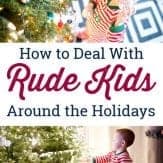
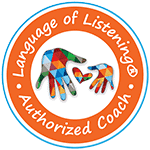
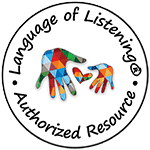
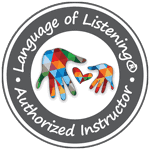
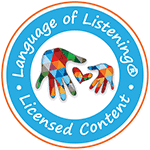








Hi Lauren,
I’ve caught a few of your posts on pinterest and love them! Your insight is spot on and thoughtful! I find it refreshing how compassionate yet direct your guidance is. As a licensed psychotherapist I love to spread your ideas to parents and as a recent new mom I appreciate the tools for connecting with my little one. Keep up the great posts! Lots of love!
– Viv
I love how “SPOT ON!!!” your posts are! Thank you yet again. Needed some tips for this exact problem, and as always I know they will work. You Rock!
This is great – and timely! – information! Thank you!
A friend just shared a story re: her almost 7yo daughter, whom I’ll call “Nell”. The school provided a “Christmas Store” opportunity for the kids to “shop” for their loved ones’ gifts. My friend gave Nell $20 to shop, but Nell decided she wanted a particular $12 item for herself and cried inconsolably when she was told she couldn’t get it. A discussion about generosity was had, and then on the shopping day, Nell bought the $12 item for herself, and was remorseful that she didn’t have enough to also buy for all her loved ones. My friend was very frustrated and felt like a failure.
What’s the best way to handle a situation like this?